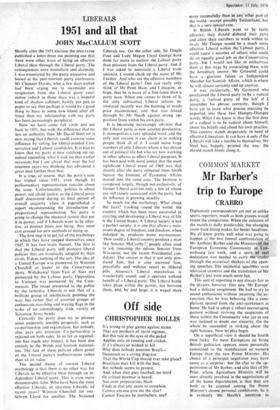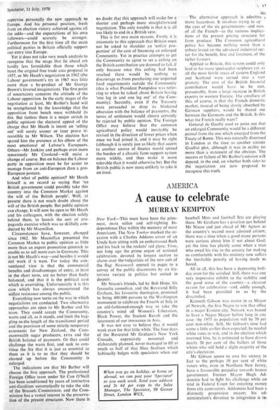COMMON MARKET
Mr Barber's
trip to Europe
CRABRO
Diplomatic correspondents are not so unlike sports reporters, much as both groups would resent the comparison. When the outcome of the match is dully predictable, the changing room back-biting makes for better headlines. We all knew pretty well what was going to happen at the first formal confrontation of Mr Anthony Barber and the Ministers of the European Economic Community in Lux- embourg last week, and a spirit of real dedication was needed to carry the reader through the oratorical thickets of the open- ing speeches. The incidental squabbles over television cameras and the translation of Mr Barber's text were much more fun. • This sort of reporting is not always fair to the players, however. Our new 'Mr Europe' had a delicate assignment. He had to try to sound enthusiastic without incurring the ac- cusation that he was behaving like a com- plaisant spaniel from the anti-marketeers at home. He had to adopt a robust encouraging posture without reviving the suspicions of those within the Community who are in any way inclined to doubt our sincerity. On the whole he succeeded in striking about the right balance. Now let play begin.
On a superficial view it should be fourth time lucky. To most Europeans no living British politician appears more personally committed to the reunification of western Europe than the new Prime Minister. His choice of a principal negotiator may have come as a surprise : but the clue to the ap- pointment of Mr Barber, and also that of Mr Prior, whose Agriculture Ministry will be Most directly involved in the negotiations of all the home departments, is that they are both to be counted among the Prime Minister's closest personal confidantes. So it is evidently Mr Heath's intention to
supervise personally the new approach to Europe. And his. personal position, fresh
from an election victory achieved against all the odds—and the expectations of his own followers—could scarcely be stronger.
Furthermore for the first time all the main political parties in Britain officially support our entry into Europe.
Yet it does not take very much analysis to recognise that the snags that lie ahead are hardly less formidable than those which beset the original free trade area proposal in 1957, or Mr Heath's negotiation in 1962 (the Labour government's try in 1967 was little more than a by-product of Mr George Brown's fevered imagination). The first point of uncertainty concerns the attitude of the Labour opposition. In the early stages of the negotiation at least, Mr Barber's hand will be strengthened by the knowledge that the opposition front bench must withhold its fire. But (unless there is a major switch in public opinion) the electoral appeal of the charge that Mr Heath is intent on 'selling out' will surely sooner or later prove ir- resistible to Mr Wilson. The election has spared him the presence at his elbow of the most emotional of Labour's Europeans. Others—Mr Jenkins and perhaps even more
tenaciously Mr Crosland—will resist a change of course. But on balance the Labour party in opposition must be far easier to manage from an anti-European than a pro- European posture.
And what of public opinion? Mr Heath himself is on record as saying that 'no British government could possibly take this country into the Common Market against the will of the British people'. Well, at present there is not much doubt about the will of the British people. But public opinion can change. It will now be open to Mr Heath and his colleagues, with the election safely behind them, to launch the sort of pro- paganda exercise which was so skilfully con- ducted by Mr Macmillan.
Circumstances have, however, changed since 1962. Mr Macmillan presented the Common Market to public opinion as little more than an export promotion gimmick to enable us to sell more cars in Germany. This is'not Mr Heath's way—and besides it would not work if it were. For today the con- ventional view is that the commercial benefits and disadvantages of entry, at least in the short term, are no better than finely balanced, and that it is the political case which is overriding. Unfortunately it is this case which- has always encountered the stiffest resistance among the public.
Everything now turns on the way in which negotiations are conducted. Two alternative approaches are open to Mr Barber and his team. They could accept the Community, warts and all, as it stands, and limit the hag- gling to.the length of the transitional period and the provision of some strictly temporary easements for New Zealand, the Com-
monwealth sugar producers, EFTA and the British balance of payments. Or they could challenge the warts first, and seek to con- vince the Six that it is just as essential to them as it is to us that they should be cleaned up before the Community is enlarged.
The indications are that Mr Barber will choose the first approach. The professional Foreign Office team under Sir Con O'Neill has been conditioned by years of instinctive anti-Gaullism automatically to take the side of the Brussels CoMmission; and the Com- mission has a vested interest in the preserva- tion of the present structures. Now there is no doubt that this approach will make for a shorter and perhaps more straightforward negotiation. The only trouble is that it is all too likely to end in a British veto.
This is for two main reasons. Firstly it is axiomatic to this approach that Britain must not be asked to shoulder an 'unfair pro- portion' of the cost of financing an enlarged Community. Yet in practice attempts to get the Community to agree to set a ceiling on the British contribution are doomed to fail, if only because once this ceiling had been reached there would be nothing to discourage us from purchasing our imported food requirements outside the Community (this is what President Pompidou was refer- ring to when he talked about Britain having 'one leg in and one leg out' of the Com- munity). Secondly, even if the Treasury were persuaded to drop its blinkered obsession with the balance of payments, the terms of settlement would almost certainly be rejected by public opinion. The Foreign Office may believe that the common agricultural policy would inevitably be revised in the direction of lower prices when once we had joined it, and it may be right (although it is surely just as likely that access to another source of finance would spread the burden of a chaotic farm support system more widely, and thus make it more tolerable than it would otherwise be). But the British public is now most unlikely to take it on trust. The alternative approach is admitteci more hazardous. It involves trying to or the eyes of the six governments—and mos of all the French—to the ruinous implica- tions of the present pricing structure for farm produce. The Common agricultural policy has become nothing more than a tribute levied on the advanced industrial sec- tor for the benefit, first and foremost, of the richer farmers.
Applied to Britain, this system could only lead to far more spectacular surpluses yet, as all the most fertile areas of eastern England and Scotland were turned into a vast granary. The cost of the British financial contribution would have to be met. presumably, from a large increase in British exports to western Europe. The corollary of this, of course, is that the French domestic market, instead of being slowly absorbed by German suppliers, would be shared out between the Germans and the British. Is this what the French really want?
General de Gaulle used to point out that an enlarged Community would be a different animal from the one which emerged from the Treaty of Rome. This was naturally dismissed in London at the time as another sinister Gaullist plot, although it was in reality no more than a statement of the obvious. The success or failure of Mr Barber's mission will depend, in the end, on whether both sides to the negotiation are now prepared to recognise this truth.































 Previous page
Previous page